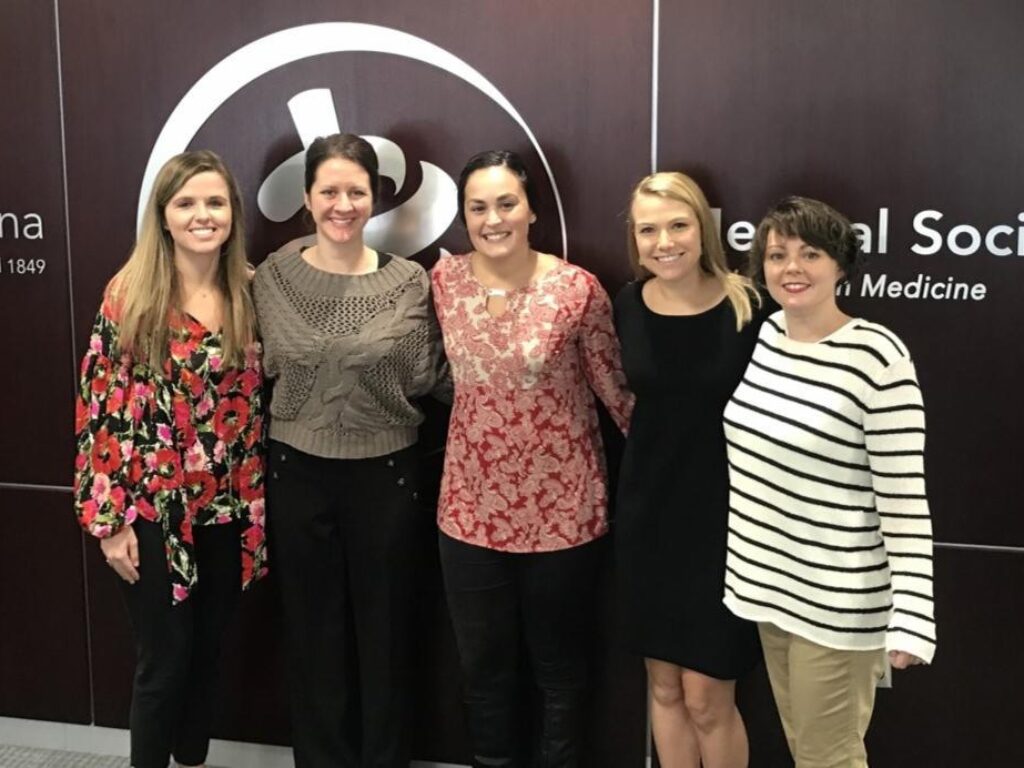Shannon Brown is the only pharmacy candidate accepted in to prestigious program

Shannon Brown (’20 PharmD/MSPH Candidate) shares her experience as part of an interprofessional team within the North Carolina Medical Society. She is second from the right in the photo.
_____________________________
The Future Kanof Institute for Physician Leadership (KIPL) Clinician Leaders College is an interprofessional leadership development program which allows students of all disciplines to develop his/her leadership at the individual, organizational, and societal level as well as build his/her network within the community of public and private healthcare systems.
During the course of this program, I am working with Niki Winters (ECU, MD), Jamiee Watts (UNC – Greensboro, DNP), Macelyn Batten (Campbell, CUSOM), and Carissa Sedlacek (Campbell, CUSOM) to tackle one of the major policy challenges facing healthcare in North Carolina. At the completion of the program, we will have finalized a 4-page paper discussing our healthcare topic, its impact on North Carolina, and a proposed solution. With this research, we will present our solution at a White Coat Wednesday. White Coat Wednesday is an event that occurs regularly in Raleigh and will allow us to meet our representatives, get an inside look on what happens in the General Assembly, and learn about the current issues being discussed between state leaders.
We started the program in September 2019, where we discussed our leadership styles, strengths, weaknesses, and values. At the end of the session, we determined which healthcare problem we wanted to pursue and broke into teams. Our team was tasked to identify a policy with a population health focus. With this focus, we narrowed down a problem facing healthcare to a specific, relevant, and actionable topic, House Bill (HB) 579 – Communicable Disease Programs. We chose HB 579 due to the alarming increase in the rate of sexually transmitted infections (STIs), especially the number of chlamydia, gonorrhea, and syphilis cases, across the United States and in the state. STIs remain a public health threat due to drug use, poverty, stigma, decreased condom use among vulnerable populations, and budget cuts within local health departments. According to the annual Sexually Transmitted Disease Surveillance Report released by the Centers for Disease Control and Prevention (CDC), combined cases of syphilis, gonorrhea, and chlamydia reached an all-time high in the US in 2018.
For the remainder of year, our team will research ideas on how to address this public health problem, identify how other states are tackling this problem, and devise an appropriate solution. Due to the stigma around STIs, loss of patient follow-up due to hospital discharge, and inappropriate treatment/screening methods, we intend on addressing this public health concern by finding ways to intervene in the prevention and early detection/treatment of gonorrhea and chlamydia in acute healthcare settings.
Being the only pharmacy candidate accepted into the first cohort of students to complete the KIPL Clinician Leaders College has been a truly humbling experience. I’m eager to see the advances our team is able to accomplish over the next year and the wonderful opportunities this program has to offer! I hope CPHS students continue to stay involved in this program for years to come!
